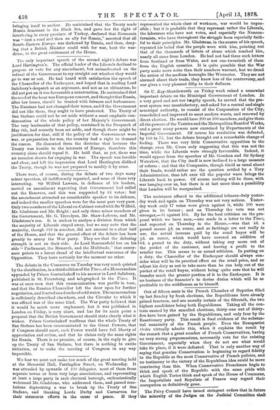The only important speech of the second night's debate was
Lord Hartington's. The official leader of the Liberals declined to propose or vote for any amendment, but animadverted on the refusal of the Government to say straight out whether they would go to war or not. He had heard with satisfaction the speech of the Chancellor of the Exchequer, and hoped that in reading Lord Salisbury's despatch as an argument, and not as an ultimatum, he did not put on it too favourable a construction. He maintained that the need of the hour was European concert, and thought that Russia, after her losses, should be treated with fairness and forbearance. The Russians had not changed their terms, and if the Government did not like them, they ought to have protested. The Treaty of San Stefano could not be set aside without a most emphatic con- demnation of the whole policy of her Majesty's Government. The very landmarks of that policy, contained in the Despatch of May 6th, had recently been set aside, and though there might be justification for that, still if the policy of the Government were war, or preparation for war, the country had a right to demand the reason. He dissented from the doctrine that because the Treaty was hostile to the interests of Europe, therefore this country alone should repeal it. He held that, as yet, there was no occasion shown for engaging in war. The speech was forcible and clear, and left the impression that Lord Hartington disliked the Treaty, though he was not prepared to modify it by arms.


































 Previous page
Previous page